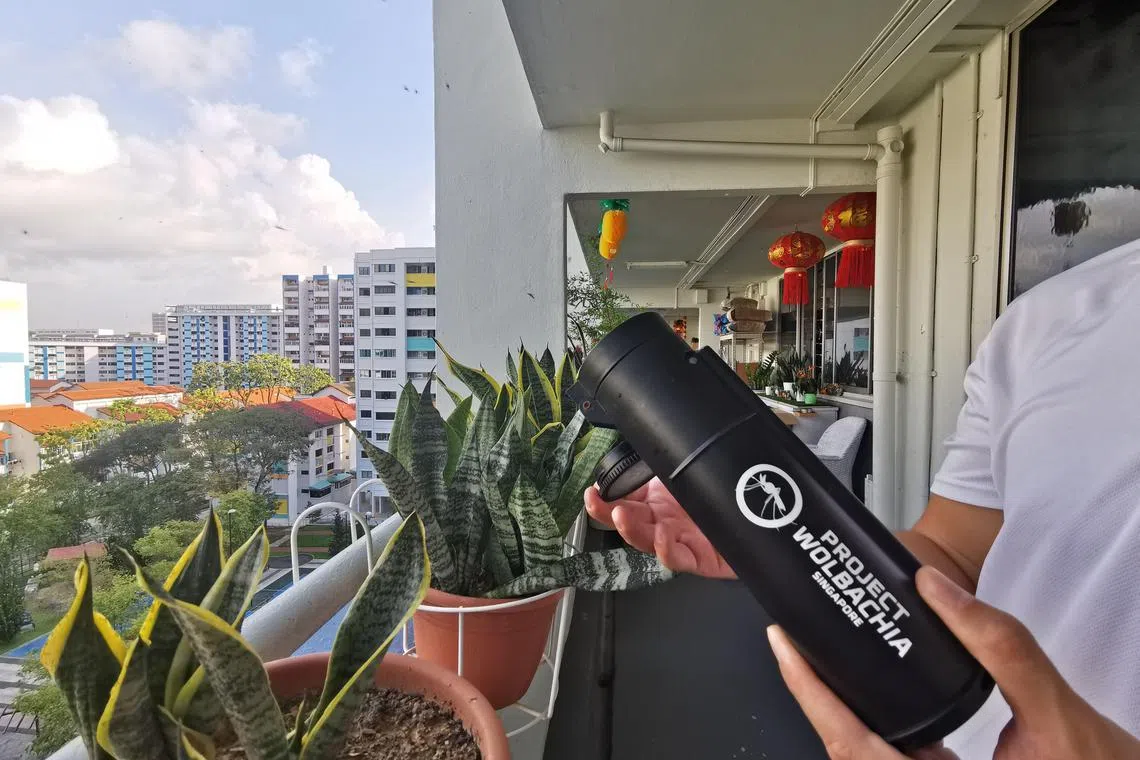NEA to expand Project Wolbachia as Aedes mosquito population plunges 90% at four sites
Sign up now: Get ST's newsletters delivered to your inbox

The project covered 13 sites, which included 30 per cent of all Housing Board blocks and nearly a tenth of private landed homes.
PHOTO: LIANHE ZAOBAO
SINGAPORE - More than one million residents have benefited from Project Wolbachia,
Female mosquitoes that mate with the Wolbachia-Aedes mosquitoes produce eggs that do not hatch.
The project complements other dengue control measures, such as conducting intensive vector control operations at dengue cluster areas.
The project covered 13 sites making up 30 per cent of all Housing Board blocks and nearly a tenth of private landed homes.
In Tampines, Yishun, Choa Chu Kang and Bukit Batok, the Aedes mosquito population was reduced by more than 90 per cent, while the number of dengue cases was 88 per cent lower compared with areas not covered by the project.
A survey of residents in these areas found that 96 per cent supported the project.
Senior Parliamentary Secretary for Sustainability and the Environment Baey Yam Keng highlighted these results of Project Wolbachia at the opening ceremony of the 7th Singapore International Dengue Workshop at JEN Singapore Tanglin hotel on Monday.
The National Environment Agency (NEA) plans to expand the release of male Wolbachia-Aedes mosquitoes to more areas in the coming years, he added.
Project Wolbachia had earlier caused alarm among some residents, who had noticed swarms of mosquitoes but were not aware of NEA’s plans to release the Wolbachia-Aedes mosquitoes.
A serious outbreak saw over 32,000 dengue cases reported in Singapore in 2022, while the 19 dengue deaths recorded were nearly four times that in 2021.
While a lower number of cases has been reported in 2023 – 2,944 by May 5, compared with 7,505 in the same period in 2022 – NEA maintains that the risk of transmission remains high.
Since the beginning of this year, weekly dengue cases have remained above 100, mainly driven by the dengue virus serotype 3 (DenV-3), which people have less exposure and therefore lower immunity to.
DenV-3 emerged as the most prevalent serotype in late 2021, and drove Singapore’s dengue outbreak in 2022.
Mr Baey noted that vaccination is currently ineffective in containing dengue transmission. This is because the vaccine approved for use in Singapore is effective in protecting only individuals who have had dengue before, but most people have not.
He said: “We will continue to monitor vaccine development as part of a multi-pronged approach to dengue control in Singapore.”
The warmer months from May to October usually see higher dengue transmission in Singapore due to accelerated development of the Aedes mosquito vector and faster multiplication of the dengue virus in mosquitoes.
Human-induced global warming could also prolong the warmer season, noted Dr Rabindra Abeyasinghe, the World Health Organisation’s head of Malaysia, Brunei and Singapore.
“Warm seasons could be longer and temperatures could be higher, so these factors will continue to increase vector breeding and transmission,” he said on the sidelines of the workshop.
“Pathogens within the vectors also thrive better in warmer temperature, and that could spur transmission of vector-borne diseases like dengue, chikungunya, malaria, Zika and Japanese encephalitis.”
The week-long workshop is hosting more than 150 participants from 23 countries to exchange knowledge and promote collaboration in the global fight against dengue.
The workshop will also see Singapore sharing its experience in dealing with endemic dengue.


